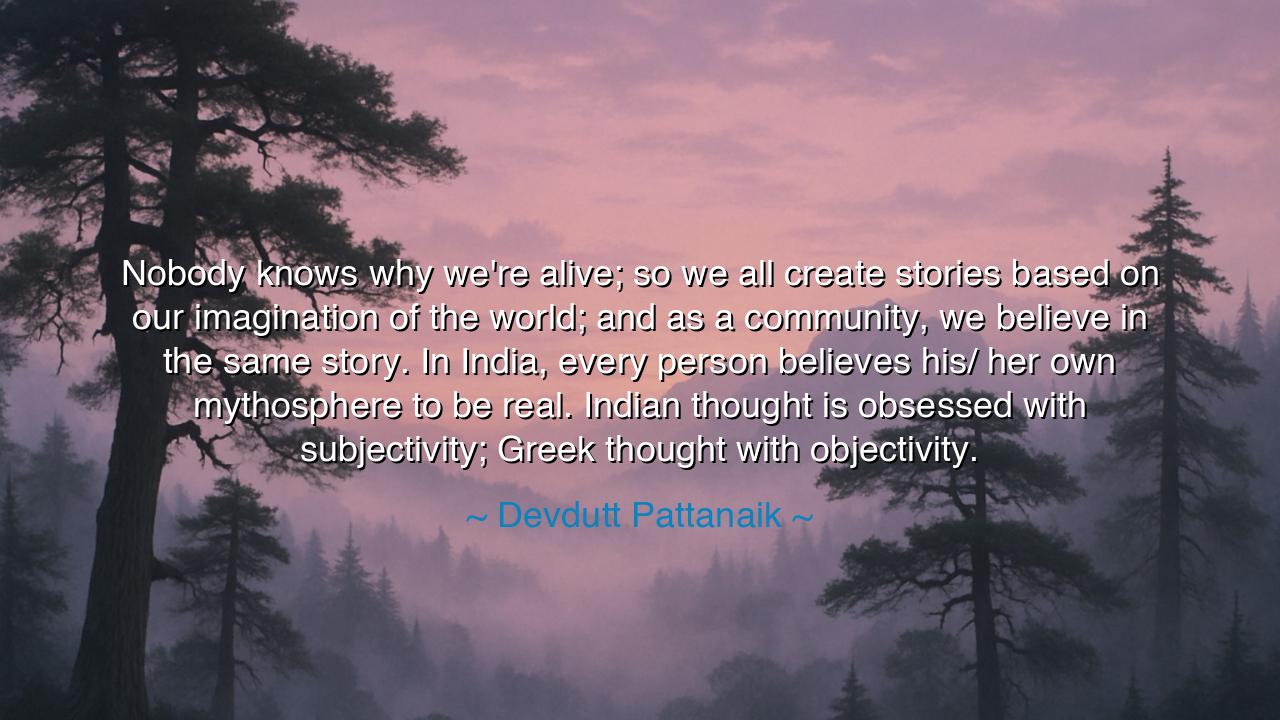
Nobody knows why we're alive; so we all create stories based on
Nobody knows why we're alive; so we all create stories based on our imagination of the world; and as a community, we believe in the same story. In India, every person believes his/ her own mythosphere to be real. Indian thought is obsessed with subjectivity; Greek thought with objectivity.






The words of Devdutt Pattanaik — “Nobody knows why we’re alive; so we all create stories based on our imagination of the world; and as a community, we believe in the same story. In India, every person believes his/her own mythosphere to be real. Indian thought is obsessed with subjectivity; Greek thought with objectivity.” — rise like a flame from the heart of philosophy itself. In this reflection, the wise author unveils the mystery of existence — that no human being truly knows why we are here, and so we weave meaning through imagination, through myth, through the sacred art of storytelling. From this act of imagination, entire civilizations are born. It is not knowledge, but belief, that shapes the architecture of culture and the destiny of humankind.
Since time immemorial, humanity has sought to explain the unfathomable. The ancients looked to the heavens, to the seas, to the stars, asking: What is the purpose of our lives? Yet no voice thundered an answer from the void. So the human spirit, unable to bear silence, began to dream. Out of dream came myth, and out of myth came meaning. Each civilization — from the sages of the East to the philosophers of Greece — built its world upon a different kind of seeing. As Pattanaik reveals, Indian thought chose to look inward, into the mirror of the soul, while Greek thought turned its gaze outward, toward the visible order of the universe. Thus were born two ways of knowing: the subjective and the objective.
In the Indian mythosphere, truth is fluid, woven from perception and experience. What is real is not fixed, but shaped by consciousness. The ancient sages said, “The world is as you see it.” This vision is not chaos but compassion — for it allows every soul to carry its own truth, its own relationship to the divine. The gods themselves shift forms in the Indian mind: Vishnu becomes Krishna, Shiva becomes Ardhanarishvara, male and female merge, creation and destruction dance as one. This is subjectivity — the sacred acknowledgment that reality is colored by the seer’s eye. To deny another’s vision is to deny a part of the cosmos itself.
By contrast, the Greek mythos sought the order behind appearances — the eternal laws that govern the stars, the body, and the state. To the Greeks, objectivity was truth: that which remains the same for all, regardless of who beholds it. Plato spoke of the Forms — perfect ideals that exist beyond perception. Aristotle mapped the logic of nature, separating essence from illusion. Their pursuit was noble, disciplined, and rational, yet it was also bound by boundaries: it sought certainty where perhaps only mystery reigns. The Indian thinker, meanwhile, did not hunger for control of truth, but communion with it. He saw that there may be as many worlds as there are minds to perceive them.
Consider how these two ways of thinking shaped history. In ancient Greece, philosophers argued for the supremacy of reason, and from that soil grew the sciences, politics, and architecture of Western thought. In India, sages meditated beneath trees, journeying inward toward self-realization, birthing the philosophies of the Upanishads, the compassion of Buddha, and the cosmic dance of Shiva. One sought to measure the universe; the other to merge with it. Yet both were children of the same human need — the need to make sense of existence through story and imagination.
This duality continues even today. Some seek absolute truth — the measurable, the provable, the external. Others seek inner harmony, the understanding that meaning is born from within. Yet Pattanaik’s wisdom reminds us that both paths are incomplete alone. If we worship only objectivity, we risk forgetting the poetry of life. If we live only in subjectivity, we may lose the shared language that binds us as a people. The harmony of the two — the discipline of the mind joined with the vision of the spirit — is the wholeness that the ancients sought but rarely named.
Let this, then, be the lesson: we are all storytellers in the grand theater of existence. None of us knows the final truth, but each of us carries a fragment of it in the form of imagination. The stories you tell — about yourself, your world, your gods — are the fabric of your reality. Tell them wisely. Let your mythosphere be one of compassion, not conquest; of understanding, not arrogance. Seek knowledge as the Greeks did, but temper it with empathy as the Indians did. For truth is not a single mountain to be conquered, but a constellation of lights — each shining from a different soul.
And so, as the ancients would teach, honor both the seer and the scientist within you. Live with eyes open to the world, but also inward to the heart. Remember that the purpose of imagination is not to escape truth, but to reveal it in forms the intellect alone cannot hold. For while nobody knows why we are alive, it is through imagination that life becomes worth living — through story that the nameless becomes sacred, and through compassion that our many worlds become one.






AAdministratorAdministrator
Welcome, honored guests. Please leave a comment, we will respond soon